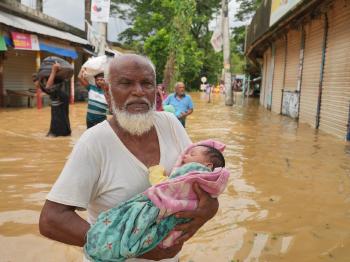Christians joined Hindus and Buddhists in calling for greater protection for religious minorities in Bangladesh following attacks on dozens of Hindu temples and the deaths of at least seven people during days of clashes involving radical Muslims.
The Hindu Buddhist Christian Unity Council, which brings together the country’s religious minorities, took part in a 12-hour hunger strike and rally in Dhaka on October 23 urging the government to set up an independent commission of inquiry into the violence. It also called for greater participation of minority representatives in the government.

Peaceful participants at the Dhaka rally called for an independent inquiry into days of anti-Hindu violence [Image credit: Asianews]
Hemanta Corraya, secretary of the Christian Association of Bangladesh, spoke in support of the Hindu community: “We want justice for our brothers and sisters, and we ask the government to put a stop to the propaganda on Facebook.”
The wave of anti-Hindu violence began on October 13, the first day of the Hindu Durga Puja festival, after a photograph was posted on social media showing a copy of the Quran at the feet of a statue at a Hindu temple, causing anger among the Muslim community. Police later arrested a Muslim extremist on suspicion of disseminating the picture.
Clashes began in the city of Cumilla, where four Muslims died after police fired into crowds of protesters. About 10 Hindu temples and shrines were vandalized. In the following days, violence spread to the capital, Dhaka, and to the southern town of Begumganj. One Muslim and two Hindus died in the unrest, one from stab wounds.
The government has condemned the violence and promised it will be thoroughly investigated.
In November 2020, Bangladeshi Christians joined other minority groups in a 500-strong peaceful protest march in Dhaka against Islamist extremist attacks on minority communities. Minority leaders said communities were living with uncertainty because “the government failed to protect them” and highlighted the role of social media in persecution-related incidents.
The Christian minority, estimated at 1% of the population, has typically enjoyed greater religious freedom in Bangladesh than in many other Muslim-majority countries, but, along with the estimated 9% Hindu and small Buddhist populations, is subject to discrimination from the 90% Muslim majority. Violence against Christians, particularly in rural areas, has been growing, with those active in evangelism and those converting from Islam especially targeted. The country’s constitution gives religious minorities the right to practice and share their faith, but Islam is the state religion.

